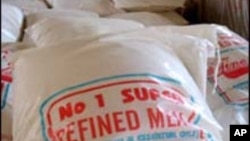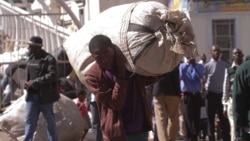Economists say Zimbabwe’s economy is headed for total collapse as government struggles to pay workers, pensioners and finance its operations due to the shrinking tax base.
In his midterm fiscal policy review recently, Finance Minister Patrick Chinamasa painted a grim picture of the country’s dwindling tax base as the economy slowly grinds to a halt.
With the majority of the country’s population now out of gainful employment, the government has been missing its revenue targets with analysts claiming that most companies, including those that are doing well, are not paying taxes because of political connections.
The major source of income for the state such as Valued Added Tax (VAT), Pay As You Earn (PAYE) have all been performing below expectations.
PAYE collections up to June this year were $385 million against a $390 million target while VAT collections were $482 million against a target of $512 million.
Economist Nyasha Muchichwa says with ongoing company closures and retrenchments, the tax base will shrink even further and this could result in the government failing to pay its workers by year end.
GOVERNMENT COLLAPSE
Former treasury chief economist, Masimba Manyanya, says the current scenario is very dangerous as it can lead to the collapse of the government.
With 83 percent of the budget going towards employment costs, the government is already failing to finance its operations prompting the opposition and other stakeholders to call on the government to abandon its policies and hold an all stakeholders conference to address the nation’s socio-economic problems.
Allocations to public institutions such as hospitals have been far less than expected and unable even to meet the basic needs. Analysts say as a result, many people are losing their lives unnecessarily because the hospitals are not well-equipped and the situation is worse for the poor who are not covered by any social benefits.
In 2014 government set aside $23 million for public hospitals when the health institutions owed suppliers more than $36 million.
Indications are that the government has been getting revenues from some of its companies, such as firms mining diamonds in Manicaland province to finance its operations but options are running out as diamond revenues have fallen and the companies are being merged.
Telecommunications giant, Econet Wireless Zimbabwe, is one of the very few companies oiling the government’s machinery by paying tax on time, economists say.
CIVIL SERVANTS
Mbada Diamond chairman Robert Mhlanga last year told parliament his company was at one time contributing towards civil servants salaries.
Manyanya says the government could be forced to look for money elsewhere, including raiding accounts of its companies as what happened during the hyperinflation era when it ended up even raiding accounts of individuals and non-governmental organizations.
He argues that a viable option for government would be to borrow money or look for outside help. But its poor record in servicing debts and bad relations with the outside world mean nothing may come out of efforts to source money externally.
Finance Minister Patrick Chinamasa has introduced a number of tax measures to improve government revenues.
This includes taxing benefits for executives and empowering the Zimbabwe Revenue Authority (ZIMRA) to collect outstanding taxes from private and public companies.
The Auditor-General’s 2014 report on the operations of state enterprises and parastatals indicates that these companies owed ZIMRA more than a billion dollars in uncommitted tax revenues.
LACK OF TRANSPARENCY
But Muchichwa and Manyanya say lack of transparency in government expenditure and corruption, among other factors, led to tax evasion by many companies and individuals.
Analysts say the government should reduce foreign travel and luxurious spending by ministers and other top state officials.
Independent economist, James Johwa, says the gloomy mood in the country can only be improved if the ruling Zanu PF government admits that it has failed to run the country or rescue the sliding economy.
Statistics from the National Statistics Agency show that more than 60 percent of the country’s pollution is poor and 70 percent of the formally employed earn about $350 per month.
In some provinces like Matabeleland North, poverty levels are above 81 percent.
According to the statistics agency, about 4 million Zimbabweans are now operating in the untaxed informal sector which has not been getting support from the government or the formal financial sector.
Economists say the only way out for the government is to implement policies that stimulate economic growth and development. Of major importance, they add, is the need for Harare to introduce investor-friendly policies to attract the much-needed foreign direct investment that will result in employment creation and an increase in the faltering tax base.









